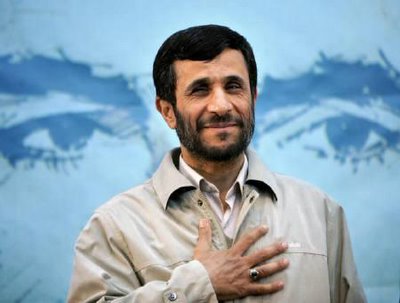 Joseph J Kurr, an American said that it is not a matter of if Iran will have the bomb - it is a matter of when. Iran's motive for becoming a nuclear power is not purely political. Its desire to become the next nuclear power stems from a strong sense of nationalism and an equally strong distrust of US intentions. With that in mind, the US needs to reexamine its current albeit hawkish policy towards Iran.
Joseph J Kurr, an American said that it is not a matter of if Iran will have the bomb - it is a matter of when. Iran's motive for becoming a nuclear power is not purely political. Its desire to become the next nuclear power stems from a strong sense of nationalism and an equally strong distrust of US intentions. With that in mind, the US needs to reexamine its current albeit hawkish policy towards Iran. Since Iran's revolution, the US has predicted that secular Iranians would eventually reclaim their country from the mullahs. Well, the latest election actually brought an even more radical leader to Iran's presidency. Even more telling is that secular Iranians are as adamant as radicals about their country having every right to nuclear technology. This same nationalistic pride is also fuelling Iran's ambition to become a regional power.
Now place yourself in Iran's shoes. The US is occupying Iraq to the west, rebuilding Afghanistan to the east, and headquarters its Fifth Naval Fleet to the south.
This is the same US government that harshly criticizes her foreign and domestic policies at every chance, continues to freeze it’s assets since the 1979 Revolution, and is currently leveraging its UN Security Council position to put the kibosh on her nuclear ambitions. In effect, the US is undermining any chance of significant foreign investment coming Iran’s way. Is it any small wonder Iran distrust and dislike the US?
If Iran is sensible, they will play nice and come into lock step with IAEA demands while insisting on rights to develop nuclear technology under strict international monitoring and safeguards. Meanwhile, they will continue to gradually acquire the expertise, technology, and material necessary to produce nuclear weapons albeit on a much longer timetable
Distrust of US
If the US is cleaver, we will anticipate this strategy and address the dangerous half of Iran's nuclear equation: Distrust of the US. Only by assuaging Iran's fear can the US hope to bring stability to that region of the world.
Dealing with a hard line government is nothing new for the US, a prime example of which is China. Each passing day strengthens the trade relationship between our two countries while the chances of armed conflict simultaneously decrease. China's phenomenal growth is traceable to globalization and its increasing connectivity with the world economy. In 1990, one year removed from the Tiananmen Square incident, any prediction of China becoming an economic powerhouse would have been laughable. Today, Beijing is exploring ways to slow its economic growth. Foreign investment and open trade is fuelling this remarkable growth. This foreign investment is noteworthy, especially when one remembers hardliners in China are still running the show and that investors are wary of anything resembling risk.
Can we expect the same bright future for Iran? Not with the current US policy which essentially mirrors Iran's distrust.
Policy shift needed
US policy over the past 26-plus years, including unilateral sanctions, denouncements and other forms of coercion, is proving to be impotent. This same policy is arresting Iran's economic development and affirms its mistrust of the US. The US needs a seismic shift in its Iranian policy and to make it perfectly clear that if Iran stops aggressively pursuing nuclear weapon technologies and threatening its neighbors, the US will meet it halfway.
Meeting Iran halfway includes supporting Iran's ambition to become an advanced technological state and a regional power. This can be accomplished by eliminating sanctions against non-US entities investing in Iran's oil and gas sectors, encouraging technological collaborative endeavors, and giving serious thought about releasing still-frozen Iranian financial assets.
Such a move signals to Iran that the US is an honest broker and will steer Iran down the path leading towards connectivity with the rest of the world. In time, new foreign investment and trade will usher in a re-birth of Iran's economy, compelling it to adopt international rule-sets and mitigating any risk a nuclear Iran may pose. In short, Iran will avoid actions that may lead towards isolation.
It would be possible to prevent Iran from getting the bomb, but we need to think more about how to live with a nuclear Iran. When that day finally arrives, do US want to deal with an angry and fearful Iran with nothing to lose, or with an Iran connected to the world economy?
But, Sharon and Bush administrations' have been poisoning public opinion, building case against Iran; interpreting President Ahmadinejad's statements as a credible threat to Israel.
In fact, Iran has not demonstrated any territorial ambitions nor is it involved in the occupation of any foreign country as is true of both the United States and Israel .
2 comments:
Uncle,
I agree with your last statement. Whilst Iran have not forcefully terrorize other countries, US and Israel showed the world that they could, can and will. And the rest of the world could only look, condemn and shout disbelief.
I wonder should Iran did not have their nuclear base in place, perhaps US would've taken a different stance- perhaps wage another war to find weapons of mass destruction..
But, ultimately, what chances are there for Iran to survive out of this mess unharmed? Is the the current government steering themselves towards hardship, trade blockage and war?
CSH
Israel is not involved in the occupation of a foreign country.
Post a Comment